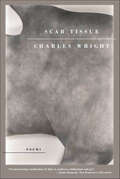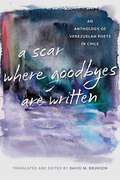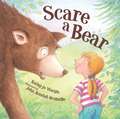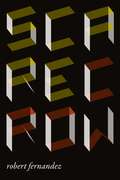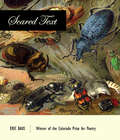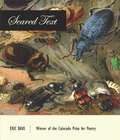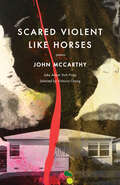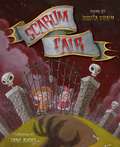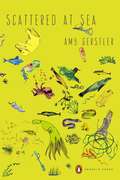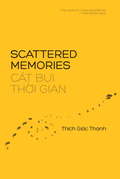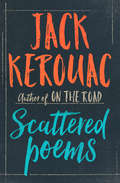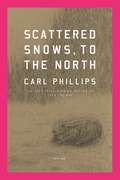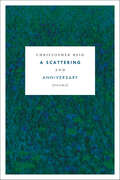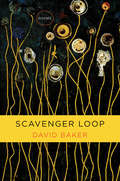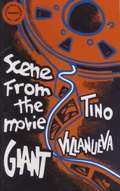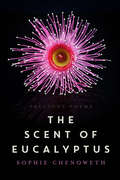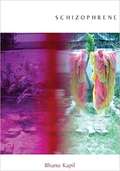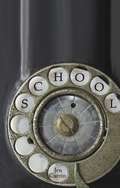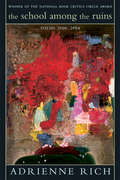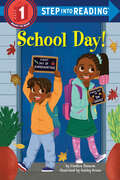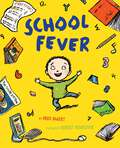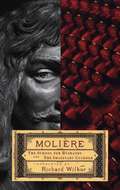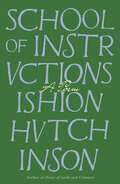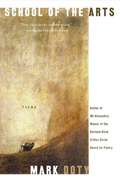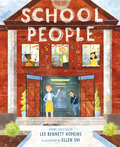- Table View
- List View
Scar Tissue: Poems
by Charles WrightHard to imagine that no one counts,that only things endure.Unlike the seasons, our shirts don't shed,Whatever we see does not see us,however hard we look,The rain in its silver earrings against the oak trunks,The rain in its second skin.--from "Scar Tissue II"In his new collection, the Pulitzer Prize-winning poet Charles Wright investigates the tenuous relationship between description and actuality--"thing is not an image"--but also reaffirms the project of attempting to describe, to capture the natural world and the beings in it, although he reminds us that landscape is not his subject matter but his technique: that language was always his subject--language and "the ghost of god." And in the dolomites, the clouds, stars, wind, and water that populate these poems, "something un-ordinary persists." Scar Tissue is a groundbreaking work from a poet who "illuminates and exalts the entire astonishing spectrum of existence" (Booklist).
A Scar Where Goodbyes Are Written: An Anthology of Venezuelan Poets in Chile
by David M. BrunsonA Scar Where Goodbyes Are Written is a bilingual anthology of poetry written by fifteen Venezuelan poets who are currently residing in Chile. Edited and translated by David M. Brunson, the volume encompasses the work of young poets coming from many different circumstances. Some have already published several books, while others have just begun their careers as writers. The vast majority of the original Spanish texts appeared in books, anthologies, and magazines across Chile, Venezuela, and elsewhere in the Hispanosphere.In recent years, more than six million people have fled Venezuela in one of the world’s largest mass migrations, stemming in part from an ongoing humanitarian crisis caused by the country’s backsliding into authoritarianism, brutal political repression, corruption, food and medical shortages, violent crime, hyperinflation, and the mismanagement of Venezuela’s natural and financial resources, first by Hugo Chávez and presently by Nicolás Maduro.Begun during Brunson’s travels in Chile amid the 2019–2020 protest movement, this dual-language collection aims to elevate the individual voices of each migrant poet, to connect them with new readers, and to enrich the body of literature available in English.
Scare a Bear
by Kathy-Jo WarginScare a Bear. Do you know how to scare a bear? Would you bang pots and pans? Would you rattle some cans? Would you shout? Would you yell? Would you ring a loud bell? Do you know how to scare a bear? How would you scare a bear out of your cabin? Or out of your fishing boat? How about away from your campfire? And what if he climbed in your bunk? Would the bed go kerplunk? From the author-illustrator team who created Moose on the Loose comes yet another example of the high jinks and hilarity that happens when wildlife wanders indoors. In this contest of wills, who will win? And once again, by story's end, young campers will know exactly how to scare a bear!
Scarecrow (Wesleyan Poetry Ser.)
by Robert FernandezTaking Dante and other catalogers of failure and ruin (Baudelaire, Trakl, Rimbaud) as its guiding lights, Scarecrow charts situations of extremity and madness: "Are you / insistent? Are you dead? / Are you guilty? Has your / name been lifted, a vein / of earth from earth?" It also charts the insistence of time's passing and with it the awakening to both new and foreclosed possibilities. What will remain for us after the disaster? How will we rebuild? To whom will we address ourselves and with what voice? Also a love poem, one of desire and hope, Scarecrow aligns a tragic sensibility with a faith in the other and in the redemptive power of forgiveness. Within the beauty and strangeness of this work rests an imperative that captures the directive of poetry at its best: "Present yourself / in the full radiance of captivation." In its mystery and defiance, Robert Fernandez's collection does precisely this. An online reader's companion will be available at robertfernandezsite.wesleyan.edu.
Scared Text (Colorado Prize for Poetry)
by Eric BausWinner of the 2011 Colorado Prize for Poetry Published by the Center for Literary Publishing at Colorado State University
Scared Text
by Eric Baus"Marvelously sustained and densely rhythmic, this tightly constructed whole is built of parts that, at each level, all the way down to the phrase, constitute poems in themselves. Baus manages to keep a cast of words in constant replay until many of them take on the presence of character, and some emerge as characters themselves-Minus and Iris, for instance-keeping the whole on the verge of a narrative project that remains always just barely out of reach, just barely in another world in which language and animal endlessly interleave. Baus has opened a new literary field: the linguistic bestiary, a new zoo where words pace like fauves behind ever-thinning bars." -Cole Swensen, contest judge and author of Greensward, Ours, and The Glass Age
Scared Violent Like Horses: Poems
by John McCarthyIn this poetry collection, the author of Ghost Country deeply examines violent masculinity, driven by a yearning for more compassionate ways of being.McCarthy’s flyover country is populated by a family strangled by silence: a father drunk and mute in the passenger seat, a mother sinking into bed like a dish at the bottom of a sink, and a boy whose friends play punch-for-punch for fun. He shows us a boy struggling to understand pain carried down through generations and how quickly abandonment becomes a silent kind of violence; “how we deny each other, daily, so many chances to care,” and how “we didn’t know how to talk about loss, / so we made each other lose.” Constant throughout is the brutality of the Midwestern landscape that, like the people who inhabit it, turns out to be beautiful in its vulnerability: sedge grass littered with plastic bags floating like ghosts, dilapidated houses with abandoned Fisher Price toys in the yard, and silos of dirt and rust under a sky that struggles to remember the ground below.With arresting lyricism and humility, Scared Violent Like Horses attends to the insecurities that hide at the heart of what’s been turned harsh, offering a smoldering but redemptive and tender view of the lost, looked over, and forgotten.Selected by Victoria Chang as winner of the Jake Adam York PrizePraise for Scared Violent Like Horses“McCarthy’s book of Midwestern threnodies begins in image and ends in solemnity . . . McCarthy’s poems are profluent stories?a joy to marvel at this skill, impressive considering the book’s bleak landscape.” —The Millions“McCarthy has whittled out a sense of freedom from the heartache of the past, and the reader is left with a remarkable vision.” —Booklist“In unshowy, plaintive, quietly delivered language that should not be mistaken for affectless?and that can be stabbed through with surprisingly piercing metaphor—McCarthy vivifies a place and hard way of life too little visited.” —Library Journal“Ultimately, what the reader is left with is a stunning overlap of lost boy and lost landscape glimpsed through the lens of a gifted poet’s magical linguistic and storytelling abilities.” —Victoria Chang“A book that grabs the reader with its insistent lyric beauty.” —Allison Joseph
Scarum Fair
by Jessica Swaim Carol AshleyEnter the Scarum Fair . . . if you dare! Take a ride on the Scary-Go-Round and Teacup Terror, or enter the Coffin Race. Meet The Head, The Hand, and Madame Ratowski, the palm reader who likes to be paid in Swiss cheese. Visit the chiropractic tent of Dr. Crunch, who'll "pulverize your sternum, and disconnect your knee, then move your metatarsals where your tailbone used to be." And unusual food awaits: sample some cat-hair stew, I-scream, and a type-A blood-red punch. Cap off the entertainment with a special event: Count Dracula's wedding.
Scattered at Sea
by Amy GerstlerA dazzling new collection from an award-winning poetAmy Gerstler has won acclaim for sly, sophisticated, and subversive poems that find meaning in unexpected places. The title of her new collection, Scattered at Sea, evokes notions of dispersion, diaspora, sowing one's wild oats, having one's mind expanded or blown, losing one's wits, and mortality. Making use of dramatic monologue, elegy, humor, and collage, these poems explore hedonism, gender, ancestry, reincarnation, bereavement, and the nature of prayer. Groping for an inclusive, imaginative, postmodern spirituality, they draw from an array of sources, including the philosophy of the ancient Stoics, diagnostic tests for Alzheimer's disease, 1950s recipes, the Babylonian Talmud, and Walter Benjamin's writing on his drug experiences.
Scattered Memories
by Giac ThanhPublished here for the first time, these fifty poems, explore his journey from young boy in Vietnam to being a leader in Thich Nhat Hanh's monastic community. The early poems reflect childhood memories of war and destruction yet are also full of romantic and poetic imagery. His later poems convey a profound wisdom and spaciousness of heart. A Zen Master in his own right, he led a life committed to cultivating great compassion and liberation through inner discovery. Light in spirit, loving and wise, sometimes strict, and often humorous, these poems perfectly capture Giác Thanh's clarity, wisdom, and kindness.
Scattered Poems: Scattered Poems, The Scripture Of The Golden Eternity, And Old Angel Midnight (City Lights Pocket Poets Ser.)
by Jack KerouacJust as he upended the conventions of the novel with On the Road, Jack Kerouac revolutionized American poetry in this ingenious collection Bringing together selections from literary journals and his private notebooks, Jack Kerouac&’s Scattered Poems exemplifies the Beat Generation icon&’s innovative approach to language. Kerouac&’s poems, populated by hitchhikers, Chinese grocers, Buddhist saints, and cultural figures from Rimbaud to Harpo Marx, evoke the primal and the sublime, the everyday and the metaphysical. Scattered Poems, which includes the playfully instructive &“How to Meditate,&” the sensory &“San Francisco Blues,&” and an ode to Kerouac&’s fellow Beat Allen Ginsberg, is rich in striking images and strident urgency. Kerouac&’s widespread influences feel new and fresh in these poems, which echo the rhythm of improvisational jazz music, and the centuries-old structure of Japanese haiku. In rebelling against the dry rules and literary pretentiousness he perceived in early twentieth-century poetry, Kerouac pioneered a poetic style informed by oral tradition, driven by concrete language with neither embellishment nor abstraction, and expressed through spontaneous, uncensored writing.
Scattered Snows, to the North: Poems
by Carl PhillipsAn arresting study of memory, perception, and the human condition, from the Pulitzer Prize winner Carl Phillips. Carl Phillips’s Scattered Snows, to the North is a collection about distortion and revelation, about knowing and the unreliability of a knowing that’s based on human memory. If the poet’s last few books have concerned themselves with power, this one focuses on vulnerability: the usefulness of embracing it and of releasing ourselves from the need to understand our past. If we remember a thing, did it happen? If we believe it didn’t, does that make our belief true? In Scattered Snows, to the North, Phillips looks though the window of the past in order to understand the essential sameness of the human condition—“Tears / were tears,” mistakes were made and regretted or not regretted, and it mattered until it didn’t, the way people live until they don’t. And there was also joy. And beauty. “Yet the world’s still / so beautiful . . . Sometimes // it is . . .” And it was enough. And it still can be.
A Scattering and Anniversary: Poems
by Christopher ReidAn exploration of love and loss by the renowned Costa Award–winning poetYou lived at such speed that the ballpoint script running aslant and fadingacross the faded bluecan scarcely keep up. Many words are illegible. I missimportant steps. Your movements blur. I want to follow, but can’t.A Scattering is a book of lamentation and remembrance, its subject being Christopher Reid’s wife, the actress Lucinda Gane, who died of cancer at the age of fifty-five. First published in the UK in 2009 to wide acclaim, winning the Costa Book of the Year, this moving and fiercely self-reflective collection is divided into four poetic sequences. The first was written during a holiday a few months before Gane’s death with the knowledge that the end was approaching; the second recalls her last courageous weeks, spent in a hospice in London; the third continues the exploration of bereavement from a variety of perspectives; and the fourth addresses her directly, celebrating her life, personality, and achievements. Paired for the first time with Anniversary, which was written to commemorate the tenth anniversary of Gane’s death, A Scattering and Anniversary brings the poet into dialogue, again, with the wife he loved. A moving exploration of the stages of grief and how the “weighty emptinesses” that remain after bereavement change us, A Scattering and Anniversary shows us what it means to love, lose, and—forever changed—continue on.
Scavenger Loop: Poems
by David BakerFrom eco-poetics to the erotic, Scavenger Loop measures the dimensions of the pastoral and the elegy in contemporary lyric poetry. In this masterful new work by "the most moving and expansive poet to come out of the American Midwest since James Wright" (Marilyn Hacker), David Baker constructs a layered natural history of his beloved Midwest and traces the complex story of human habitation from family and village life to the evolving nature of work and the mysterious habitats of the heart. At the center of Scavenger Loop is a sustained investigation of cycles and the natural recycling of things, and a discovery that even out of the discarded and the lost may come rebirth and renewal. In the process Baker reveals how everything bears the potential to be both invasive and life-giving: plants that beautify and conquer, chemicals that heal and destroy, words that mislead and instruct. Widely praised for his "impeccable formalism" (Booklist), Baker pushes to new stylistic methods, moving fluidly between unity and disorder, working at times in sustained narratives and intricate syllabics, at other times in fragments, cross-outs, and erasures. These poems praise and sing but are also clear-eyed in their documentation of destruction, the loss of human livelihood and natural habitat, the spreading threat of agri-business and unchecked development. From eco-poetics to the erotic, Scavenger Loop measures the dimensions of the pastoral and the elegy in contemporary lyric poetry.
Scenes from the Movie Giant
by Tino VillanuevaTino Villanueva recalls a scene from the movie "Giant" in which a Mexican American family is denied service at a restaurant and reflects on how the scene symbolizes the treatment of Mexican immigrants nationwide. His book-length poem captures the pain of feeling, and then forgiving, racism.
The Scent of Eucalyptus: Precious Poems
by Sophie ChenowethThis book is an ode to the fragrant, yet rough-hewn Australian bush. By delving into its pages, you will be transported to a parallel realm where flannel flowers sing, cockatoos choreograph and paperbark trees seduce. A memoir of sorts, this poignant and ethereal collection of poems celebrates the beauty, the harshness and the resilience of this ancient land and its unforgettable inhabitants. In addition, you'll be serenaded by harps and fairies, meander through time in a yellow dinghy and stand in quiet awe as a ballerina beguiles. Refreshingly honest, this waltz down memory lane is intensely emotional but has a lightness that will soothe even on the blusteriest of days. Illustrated with sensitively taken photographs, it is a keepsake you will cherish for many years to come.
Schizophrene
by Bhanu KapilSchizophrene traces the intersections of migration and mental illness as they unfold in post-Partition diasporic communities. Bhanu Kapil brings forward the question of a healing narrative and explores trauma and place through a somatic, poetic and cross-cultural psychiatric enquiry. Who was here? Who will never be here? Who has not yet arrived and never will? Towards an arrival without being, this notebook-book returns a body to a site, the shards re-forming in mid-air: for an instant.
School
by Jen CurrinAt times a call to action and at others an intimate conversation between friends, Currin's sensual and surreal poems speak to the political upheavals and environmental catastrophes of our time. School is an instruction manual for igniting transformation through a collective effort of love and community.
The School Among the Ruins: Poems 2000-2004
by Adrienne Rich"Trust Rich, a clarion poet of conscience, to get the fractured timbre of the times just right."--Booklist, starred review In this new collection Adrienne Rich confronts dislocations and upheavals in the United States at the beginning of the twenty-first century. The title poem, in a young schoolteacher's voice, evokes the lessons that children ("Not of course here") learn amid violence and hatred, "when the whole town flinches / blood on the undersole thickening to glass." "Usonian Journals 2000" intercuts faces and conversations, building to a dystopic/utopic vision. Throughout these fierce and musical poems, Rich traces the imprint of a public crisis on individual experience: personal lives bent by collective realities, language itself held to account.
School Day! (Step into Reading)
by Candice RansomIt's time for school in this Step 1 reader featuring the family from Pumpkin Day!, Apple Picking Day!, Garden Day, Snow Day, and Beach Day!The start of the new school year means new friends and new experiences! It's big sister's first day of 3rd grade, but it will be a cinch for her to show little brother the ropes on his first day of kindergarten. She already knows where all the rooms are, who the teachers are, and where to go and when at their school! It's great to have a sibling to rely on when starting something new! A day with family is always a great day! Read all the Day books:Apple Picking DayPumpkin DayGarden DayBeach DaySnow DayGrandparents DayStep 1 Readers feature big type and easy words. Rhymes and rhythmic text paired with picture clues help children decode the story. For children who know the alphabet and are eager to begin reading.
School Fever
by Brod BagertA kid's-eye view of school, crammed with enough funny to fill a big yellow bus!Snappy and hilarious in true Brod Bagert style, these goofy poems are united by their kid authenticity and quirky school themes. From a computer virus that one kid claims is sure to keep him homesick until summer vacation, to the librarian who tames "the savage beast" (a mouse run amok in the library), to a superhero recruited to scare off the school bully, this is most definitely not your typical poetry collection. Robert Neubecker's bright, dynamic artwork propels each poem into another stratosphere of funny. By the end, kids will have contracted a different strain of school fever altogether."Kids will appreciate the humor and will see themselves in the high-energy narrator"—Booklist
School for Husbands and The Imaginary Cuckold, or Sganarelle
by Richard Wilbur Jean Baptiste De Moliere"My notion of translation is that you try to bring it back alive. . . . If you take on a text which is somehow appropriate to you and which you may already love, what you want to do is to be as perfectly the slave of it as you can be."--Richard WilburOriginally inspired by a revelatory Comédie-Française production of The Misanthrope in 1948 Paris, Richard Wilbur has made translating Molière part of his lifework. These two comedies of marriage and misunderstanding are gathered here in a single volume that is part of TCG's new series (with design by Chip Kidd) to complete trade publication of these vital theatrical works.
School of Instructions: A Poem
by Ishion HutchinsonA stunning memorial work that excavates the forgotten experience of West Indian soldiers during World War I.Deep-dyed in language both sensuous and biblical, Ishion Hutchinson's School of Instructions memorializes the experience of West Indian soldiers volunteering in British regiments in the Middle East during World War I. The poem narrates the psychic and physical terrors of these young Black fighters in as they struggle against the colonial power they served; their story overlaps with that of Godspeed, a schoolboy living in rural Jamaica of the 1990s. This visionary collision, in which the horizontal, documentary shape of the narrative is interrupted by sudden lyric effusions, unsettles both time and event, mapping great moments of heroism onto the trials of everyday existence It reshapes grand gestures of heroism in a music of supple, vigilant intensity. Elegiac, epochal and lyrical, School of Instructions confronts the legacy of imperial silencing and weaves shards of remembrance—"your word mass / your mix match / your jamming of elements"—into a unique form of survival. It is a masterpiece of imaginative recuperation by a poet of prodigious gifts.
School of the Arts
by Mark DotyThe darkly graceful poems in Mark Doty's seventh collection explore the ways in which we are educated by the implacable powers of time and desire. The world constantly renews itself, and the new brings both possibility and erasure. Given the limits of our own bodies, how are we to live within the inevitability of despair? This is the plainest of Doty's books, its language stripped and humbled. But whatever depths are sounded in these poems, their humane and open music sustains. Art itself instructs us. Lucian Freud's startling renditions of human skin, Virginia Woolf's ecstatic depiction of consciousness, Caravaggio's only-too-real people elevated to difficult glory -- all turn the light of human intelligence upon "the night of time." Formally inventive, warm, at once witty and disconsolate, School of the Arts represents a poet reinventing his own voice at midlife, finding a way through a troubled passage. Acutely attentive, insistently alive, this is a book of "fierce vulnerability."
School People
by Lee Bennett HopkinsFifteen poems selected by acclaimed poet and anthologist Lee Bennett Hopkins celebrate all of the grown-ups that children encounter during the course of a school day.Welcome to school, a building of brick "full of soul and heart," eager for students and staff to fill its halls with sounds. This anthology of fifteen poems celebrates the grown-up people that children encounter throughout the course of their school day: the school bus driver with her morning smile, the teacher who inspires imagination, the rarely seen, yet caring custodian, and the nurse who heals hurts, big and small. There's even a poem about the school building. Award-winning poet and anthologist Lee Bennett Hopkins has compiled this marvelous collection featuring a variety of brand-new works by well-known poets and beautifully imaginative artwork by illustrator Ellen Shi.
